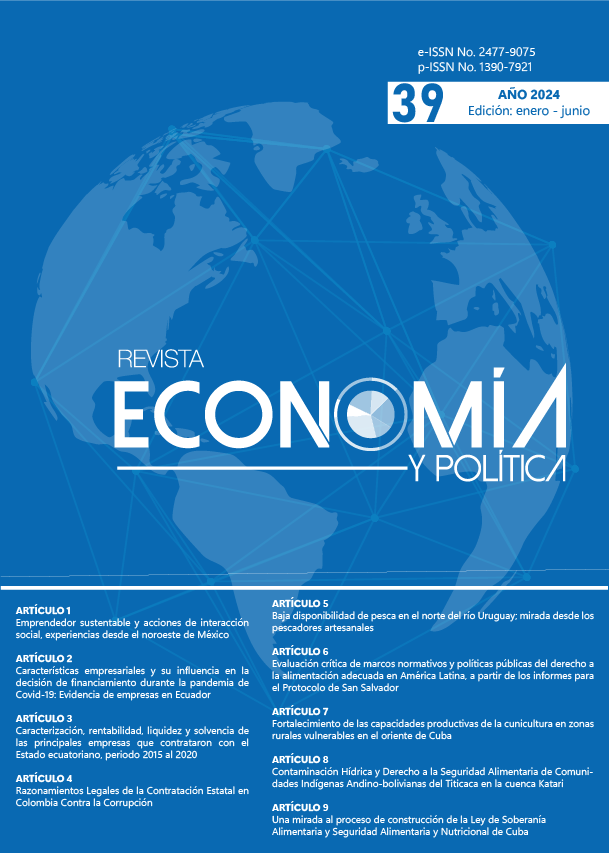Critical evaluation of regulatory frameworks and public policies on the right to adequate food in Latin America, based on the reports for the San Salvador Protocol
DOI:
https://doi.org/10.25097/rep.n39.2024.06Keywords:
right to food, hunger, equality, justice (access to), non-discrimination, malnutrition, participation, public policies, food securityAbstract
The objective of this research aims to accomplish a critical evaluation of the normative frameworks and public policies established for the right to adequate food in Latin America. As a result of the assessment, it is observed that in the countries analyzed, the development of legal and policy frameworks is still required, which must be strengthened and detailed following the most up-to-date international standards, to guarantee the right to adequate food for all people. Without robust legal frameworks, strong institutional capacities, and sufficient transversal mechanisms for the attention to food as a full right, the design and implementation of public policies will not be appropriate and comprehensive and will not have the desired impacts. Deficiencies in the structural supports for regulations and policies generate unequal impacts among the countries of the region that highlight the vulnerability of Latin America.
Downloads
References
Abramovich, V., y Pautassi, L. (Coomp) (2010). La medición de derechos en las políticas sociales. Editores del Puerto s.r.l. Argentina.
Comité de Derechos Económicos, Sociales y Culturales de las Naciones Unidas (CDESC, 1999). Observación General No. 12.
Comité de Seguridad Alimentaria Mundial CSA (2021). Los enfoques agroecológicos y otros enfoques innovadores en favor de la sostenibilidad de la agricultura y los sistemas alimentarios que mejoran la seguridad alimentaria y la nutrición.
Comunidad de Estados Latinoamericanos y Caribeños (CELAC) (2015). Plan para la Seguridad Alimentaria, Nutrición y Erradicación del Hambre de la CELAC 2025. Resumen ejecutivo.
Corte Interamericana de Derechos Humanos (CoIDH). (1999). Opinión Consultiva No. 16.
GTPSS (2015). Indicadores de progreso para la medición de derechos contemplados en el Protocolo de San Salvador.
High Level Panel of Experts, Committee of World Food Security HLPE/CFS (2021). Impacts of COVID-19 on food security and nutrition: developing effective policy responses to address the hunger and malnutrition pandemic. https://www.fao.org/3/ng808en/ng808en.pdf
ONU (2015). Informe de la Relatora Especial sobre el Derecho a la Alimentación. El acceso a la justicia y el derecho a la alimentación: el camino a seguir. A/HRC/28/65
ONU (2022). Informe del Relator Especial sobre el Derecho a la Alimentación. El derecho a la alimentación y la pandemia de enfermedad por coronavirus. A/77/177.
Organización de Estados Americanos (OEA)/ Grupo de Trabajo del Protocolo de San Salvador (GTPSS) (2013). Normas para la confección de los informes periódicos previstos en el Protocolo de San Salvador establecidas por la resolución AG/Res. 2074 (XXXV-O/05), actualizadas según lo dispuesto por la resolución AG/Res. 2713 (XLII-O/12).
Organización de las Naciones Unidas para la Alimentación y la Agricultura (FAO) (2004). Directrices voluntarias en apoyo a la realización progresiva del derecho a una alimentación adecuada en el contexto de la seguridad alimentaria nacional. Roma, Italia. FAO.
Pérez Gómez., L. (2017). Desafíos para la planeación y evaluación de políticas públicas con enfoque de derechos humanos y el uso de indicadores para su sistematización. Revista Perseo del PUDH-UNAM, número 57. Noviembre, 2017. http://www.pudh.unam.mx/perseo/desafios-para-la-planeacion-y-evaluacion-de-politicas-publicas-con-enfoque-de-derechos-humanos-y-el-uso-de-indicadores-para-su-sistematizacion/#more-20559
Published
How to Cite
Issue
Section
License
Copyright (c) 2024 Economy and Politics Journal

This work is licensed under a Creative Commons Attribution-NonCommercial-ShareAlike 4.0 International License.
The Journal declines any responsibility for possible conflicts derived from the authorship of the works that are published in it.
The University of Cuenca in Ecuador conserves the patrimonial rights (copyright) of the published works and will favor the reuse of the same ones, these can be: copy, use, diffuse, transmit and expose publicly.
Unless otherwise indicated, all contents of the electronic edition are distributed under a Creative Commons Attribution-NonCommercial-ShareAlike 4.0 International License.






